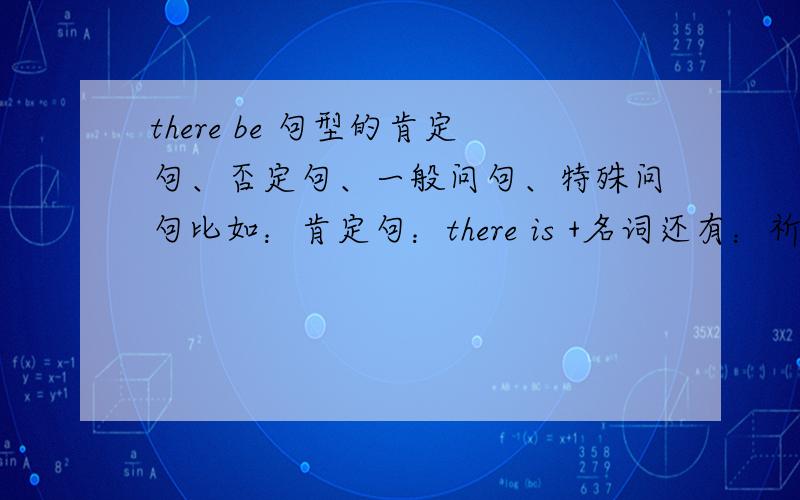there be 句型的肯定句、否定句、一般问句、特殊问句比如:肯定句:there is +名词还有:祈使句的肯定,否定和反问句.一般现在时,一般过去时,现在进行时和一般将来时的结构.
来源:学生作业帮助网 编辑:作业帮 时间:2024/11/28 18:03:56

there be 句型的肯定句、否定句、一般问句、特殊问句比如:肯定句:there is +名词还有:祈使句的肯定,否定和反问句.一般现在时,一般过去时,现在进行时和一般将来时的结构.
there be 句型的肯定句、否定句、一般问句、特殊问句
比如:
肯定句:there is +名词
还有:祈使句的肯定,否定和反问句.
一般现在时,一般过去时,现在进行时和一般将来时的结构.
there be 句型的肯定句、否定句、一般问句、特殊问句比如:肯定句:there is +名词还有:祈使句的肯定,否定和反问句.一般现在时,一般过去时,现在进行时和一般将来时的结构.
一、 写出下列动词的第三人称单数
drink ________ go _______ stay ________ make ________
look _________ have_______ pass_______ carry ____
come________ watch______ plant_______ fly ________
study_______ brush________ do_________ teach_______
二、用括号内动词的适当形式填空.
1. He often ________(have) dinner at home.
2. Daniel and Tommy _______(be) in Class One.
3. We _______(not watch) TV on Monday.
4. Nick _______(not go) to the zoo on Sunday.
5. ______ they ________(like) the World Cup?
6. What _______they often _______(do) on Saturdays?
7. _______ your parents _______(read) newspapers every day?
8. The girl _______(teach) us English on Sundays.
9. She and I ________(take) a walk together every evening.
10. There ________(be) some water in the bottle.
11. Mike _______(like) cooking.
12. They _______(have) the same hobby.
13. My aunt _______(look) after her baby carefully.
14. You always _______(do) your homework well.
15. I _______(be) ill. I’m staying in bed.
16. She _______(go) to school from Monday to Friday.
17. Liu Tao _______(do) not like PE.
18. The child often _______(watch) TV in the evening.
19. Su Hai and Su Yang _______(have) eight lessons this term.
20. -What day _______(be) it today?
- It’s Saturday. 三、按照要求改写句子
1. Daniel watches TV every evening.(改为否定句)
___________________________________________________
2. I do my homework every day.(改为一般疑问句,作否定回答)
________________________________________________________
3. She likes milk.(改为一般疑问句,作肯定回答)
______________________________________________________
4. Amy likes playing computer games.(改为一般疑问句,作否定回答)
___________________________________________________
5. We go to school every morning.(改为否定句)
_______________________________________________________
6. He speaks English very well.(改为否定句)
___________________________________________________
7. I like taking photos in the park.(对划线部分提问)
________________________________________________________
8. John comes from Canada.(对划线部分提问)
___________________________________________________
9. She is always a good student.(改为一般疑问句,作否定回答)
________________________________________________________
10. Simon and Daniel like going skating.(改为否定句)
___________________________________________________
疑问句:Have/Has+主语+动词的过去分词。
否定句:主语+haven't/hasn't+动词的过去分词。
一般现在时:I/We/You/They+动词原形。
现在进行时:主语+be+动词原形。
过去时:主语+动词过去时。
一般将来时:be going to + 动词原形/will+动词原形。...
全部展开
疑问句:Have/Has+主语+动词的过去分词。
否定句:主语+haven't/hasn't+动词的过去分词。
一般现在时:I/We/You/They+动词原形。
现在进行时:主语+be+动词原形。
过去时:主语+动词过去时。
一般将来时:be going to + 动词原形/will+动词原形。
收起
疑问句:Have/Has+主语+动词的过去分词。